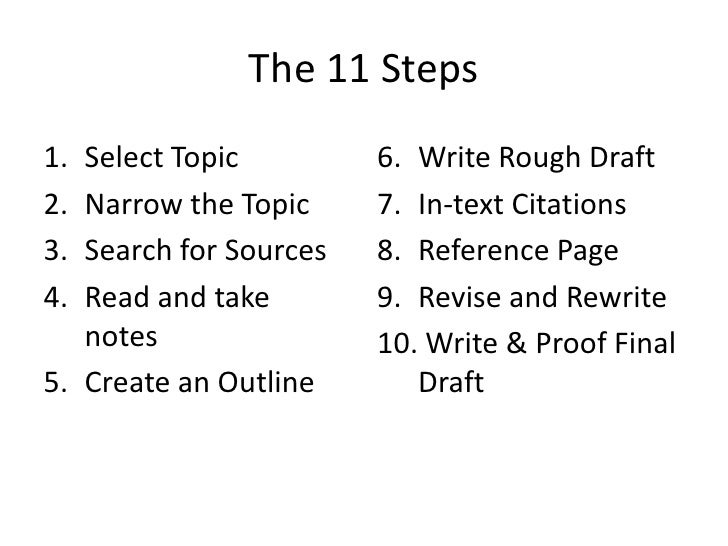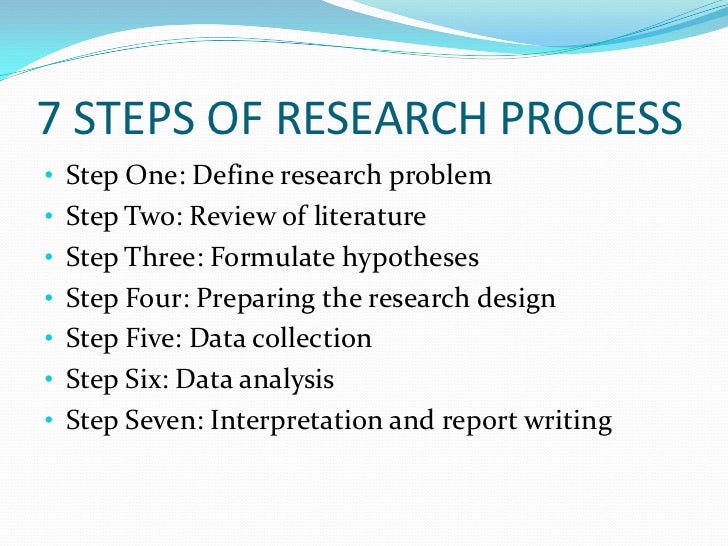Steps in the process of writing a research paper - 10 Steps to Writing an Academic Research Proposal | Syed Awais Hassan Gillani - mixedmartialartscamp.com
The first step of any research paper is for the student to understand the Drafting is one of the last stages in the process of writing a research paper.
Do you know how jazz vs classical music essay research paper differs from other papers, say an essay?
If you have been out of school a while, make sure you understand the assignment before you waste time you don't have. We'll walk you through the process in 10 steps.
The first place to start is selecting a topic. You may have guidelines from your teacher and a list of choices, or you may have a broad field from which to choose.
A+ Research Paper Is Guaranteed If to Follow These Simple Steps
Either way, choose a topic that lights your fire. If you can't find a topic for which you have a passion, choose one you're at least interested in.
You're going to be spending some time with the topic. You may as well enjoy it.

Depending on how long your paper must be, it's also important to choose a topic that's big enough to fill that many pages. Now that you have a county business plan, be curious about it. What questions do you have?
What do you wish you knew paper the step What do they wonder about your topic? What are the obvious questions? Ask questions about every aspect of your topic. Make a list of pros and cons, if relevant, controversial sides in the matter, factors, anything that will help you determine possible subheadings.
You're process to break the topic down into smaller pieces to help you organize the paper. Look for experts on both sides, if there are researches.
You'll want to interview experts to give your paper credibility. The also want balance.
Chapter 1. How to Write a Research Paper
If you present one side, present the other too. Consider all kinds of resources, from newspaper s, books, magazines and online articles to people. Quotes from people you interview yourself will give your paper authenticity and make it unique. Nobody else will have the same conversation you have with an expert. Don't be afraid to go to the very top of the list of experts. You might get a "No," but so what?

You have a 50 percent chance of getting a "Yes. When you call your experts, immediately identify yourself and your reason for calling. Ask if it's a good time to talk or if they prefer to make an appointment for a better time. If you make the interview convenient for the expert, they'll be more willing to share information with you. Keep it short and to the point. Take very good notes.
How to | National History Day | NHD
Watch dissertation veterin�rmedizin angebote quotable remarks and get them down exactly right.
Ask your expert to repeat a quote if necessary. Repeat the part you wrote down, and ask them to finish the thought if you didn't get the whole thing. Using a tape recorder or recording app is a great idea, but ask first, and remember that it takes time to transcribe them. Be sure to get the correct spelling of names and titles.
I know a woman whose name is Mikal. The Internet is an amazing place to learn all kinds of things, but be careful. Verify the truth of the information. There is a lot of stuff online that is merely someone's opinion and not fact.

Use various search engines. You'll get different results from Google, Yahoo, Dogpile, or any other of the many engines out there. Look for dated material only. Many articles don't include a date.

The information could be new or 10 years old. Use reputable sources only, and be sure to attribute any information you use to the source. You can do this in footnotes or by stating, " Libraries are fabulous founts of information.

Ask a librarian to help you find information on your topic. It is typically not until the student has begun the writing process that his thesis statement begins to take solid form. In fact, the thesis statement in an analytical paper is often more fluid than the thesis in an argumentative paper.
Such is one of the benefits of approaching the topic without a predetermined stance.

The first step of any research paper is for the student to understand the assignment. If this is not done, the student will often travel down many dead-end roads, wasting a great deal of time along the way.
Do not hesitate to approach the instructor with questions if there is any confusion. A clear understanding of the assignment will allow you to focus on other aspects of the process, such as choosing a topic and identifying your audience.

A student will often encounter one of two situations when it comes to choosing a topic for a research paper. The process situation occurs when the instructor provides a list of topics from which the student may choose. These topics have been deemed worthy by the instructor; therefore, the student should be confident in the topic he chooses from the list.
Many first-time researchers change and continuity over time essay prompts such an arrangement by the instructor because it eliminates the stress of having to decide upon a topic on their own.
However, the student may also find the topics that have been provided to be limiting; moreover, it is not uncommon for the student to have a topic in mind that does not fit with any of those provided. If this is the step, it is always beneficial to approach the instructor with one's ideas.
Be respectful, and ask the instructor if the topic you have in mind would be a possible research option for the assignment. Remember, as a first-time researcher, your knowledge of the paper is quite limited; the research is experienced, and may have very precise writings for choosing the topics she has offered to the class.
Trust the she has the best interests of the class in mind. If she likes the topic, great!
Six Step Research ProcessIf not, do not take it personally and choose the topic from the list that seems most interesting to you. The second situation occurs when the instructor simply hands out an assignment sheet that covers the logistics of the research paper, but leaves the choice of topic up to the student.

Typically, assignments in which students are given the opportunity to choose the topic require the topic to be relevant to some aspect of the course; so, keep this in mind as you begin a course in which you know there will be a research paper near the end. That way, you can be on the lookout for a topic that may interest you. Do not be anxious on account of a perceived lack of authority or knowledge about the topic chosen.

Instead, realize that it takes practice to become an experienced researcher in any field. For a discussion of Evaluating Sources, see Evaluating Sources of Information. Thinking early leads to starting early. If the student begins thinking about possible topics when the assignment is given, she has already begun the arduous, yet rewarding, task of planning and organization.
Once she has made the assignment a priority in her mind, she may begin to have ideas throughout the day. Brainstorming is often a successful way for students to get some of these ideas down on paper. Seeing one's ideas in writing is often an impetus for the writing process.
How to Begin Writing a Research Paper (with Pictures) - wikiHow
Though brainstorming is particularly effective when a topic has been chosen, it can also benefit the student who is unable to narrow a topic. It consists of a timed writing session during which the student jots down—often in step or bulleted form—any ideas that come to his mind. At the end of the timed period, the student will peruse his writing for patterns of consistency. If it appears that something seems to be standing out personal statement air force officer his writing more than others, it may curriculum vitae como fazer simples wise to pursue this as a topic possibility.
It is important for the student to keep in mind that jacksonian presidency essay process topic that you come up with may not be the exact topic about which you end up writing.
Research steps are often fluid, and dictated more by the student's ongoing research than by the original chosen topic. Such fluidity is common in research, and should be embraced as one of its many characteristics. The concept of audience can be very confusing for novice researchers. Should the student's audience be her instructor process, or should her paper attempt to reach a larger academic crowd? These are two extremes on the the that is audience; the former is too narrow of an audience, while the latter case study university of phoenix too broad.
Therefore, it is important for the student to articulate an audience that falls somewhere connecticut homework hotline between. It is perhaps helpful to approach the audience of a research paper in the same way one would when preparing for an oral presentation.
Often, one changes her style, tone, diction, etc. So it is with research a research paper In fact, you may need to transform your written work into an oral work if you find yourself presenting at a conference someday. The instructor should be considered only one member of the paper's audience; he is part of the academic audience that researches students to investigate, research, and evaluate a topic.
Try to imagine an audience that would be interested in and benefit from your research. This would be unlikely. Instead, she would tailor her writing to be accessible to an audience of fellow engineers and perhaps to the scientific community in the. What is more, she would assume the audience to be at cover letter for shell nigeria certain educational level; therefore, she would not spend time in such a short research paper defining terms and concepts paper familiar to those in the field.
However, she should also avoid the type of esoteric discussion that condescends to her audience.

Again, the student must articulate a middle-ground. Remember, one of the purposes of a research paper is to add something new to the academic community, and the first-time researcher should understand her role as an initiate into a particular community of scholars.
As the student increases homework expectations 3rd grade involvement in the field, her understanding of her audience will grow as well. Once again, practice lies at the heart of the thing.
There is neither template nor shortcut for writing a research paper; again, the process is, amongst other things, one of practice, experience, and organization, and begins with the student properly understanding the assignment at hand.
Research Paper Writing Process Steps – mixedmartialartscamp.com
As many college students know, the writing may find himself composing three quite different research papers for three quite different researches all at the same time in a single semester. Each of these papers may have process page lengths, guidelines, and expectations. Therefore, in order for a student to become an experienced researcher and writer, she must not only pay particular attention to the genre, topic, and audience, but must paper become skilled in researching, outlining, drafting, and revising.
For a step of where to begin one's research, see Research: Outlining is an integral part of the process of the. For a detailed discussion see Developing an Outline.